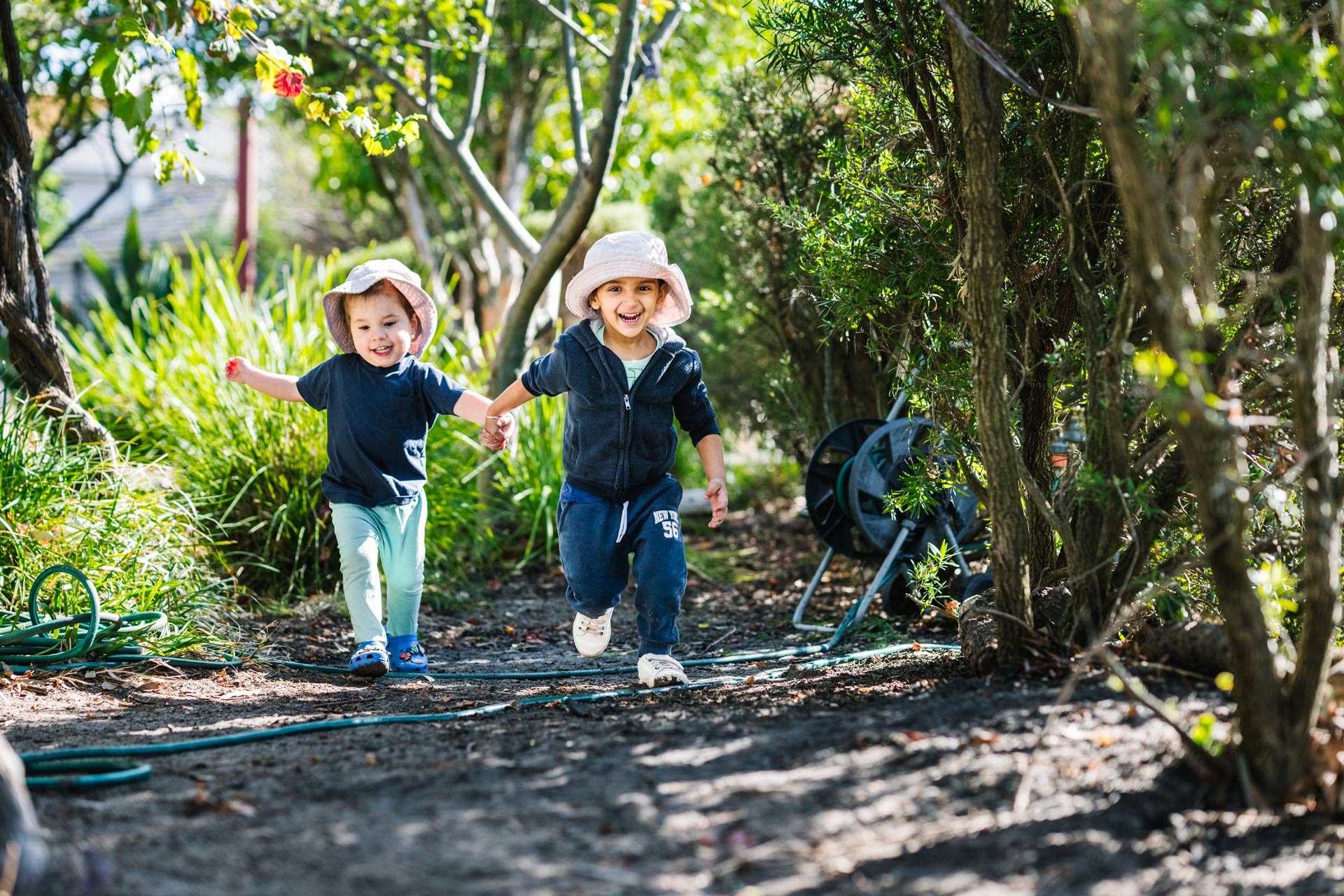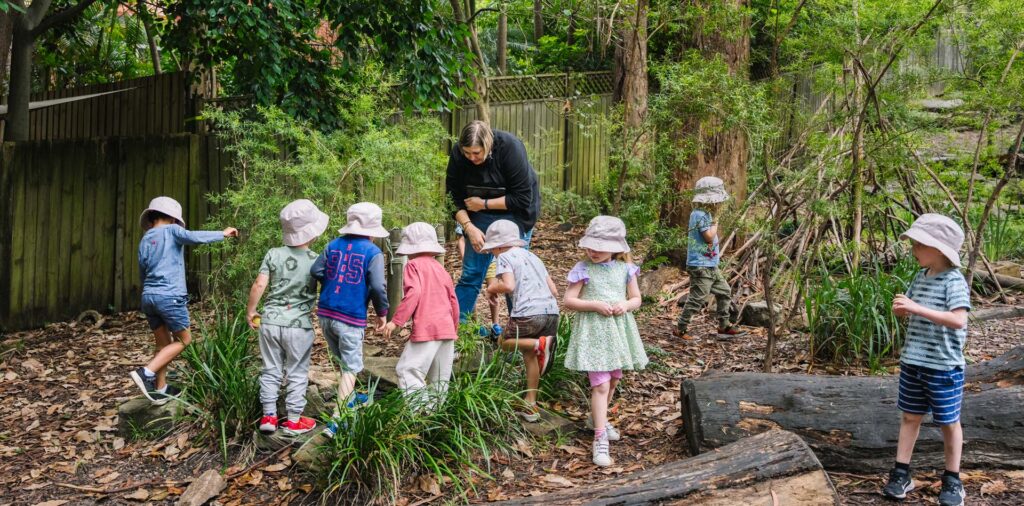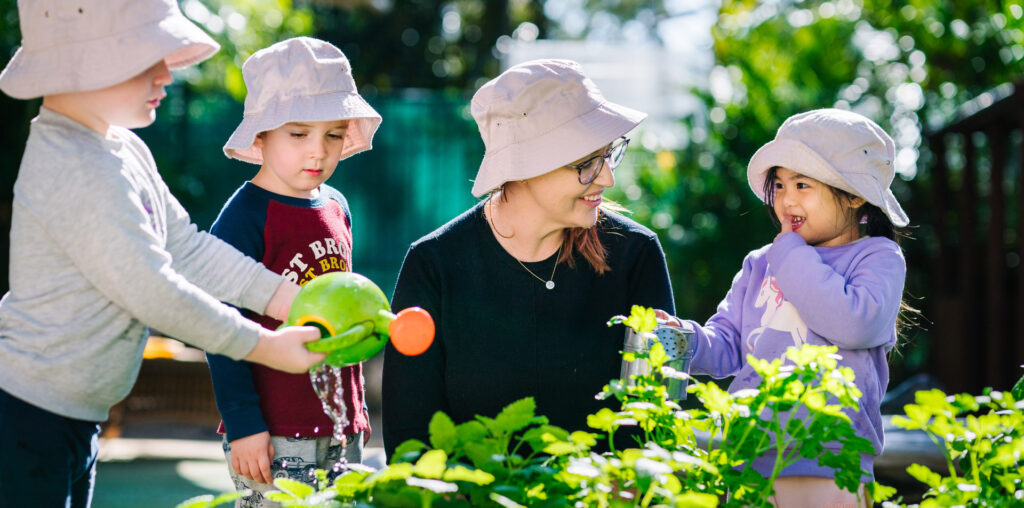
Nature’s playground: why nature pedagogy matters in early childhood education
Fiona Harris explores how nature-rich environments offer unique opportunities for sensory-rich, imaginative, and inquiry-based play.
By Fiona Harris, KU Learning and Development
August 2025
In the current landscape of early childhood education, nature pedagogy is not just a passing trend; it is a necessary response to growing concerns about children’s wellbeing, development, and relationship with the natural world. Nature play, a practice centred on children’s freely chosen, unstructured interactions with the natural environment, is increasingly being recognised as a cornerstone of high-quality early learning.
More than ever, educators are turning to nature-based experiences as a powerful pedagogical approach. This is not about taking indoor toys outside or decorating gardens with artificial grass and plastic plants. It is about crafting experiences that foster children’s curiosity, agency, creativity, and connection with place. As educators, we must move beyond viewing nature play as simply “nice to have” and begin to understand its deep relevance to children’s development, learning, and identity formation.
The case for nature play in ECE
Research consistently shows that children’s development flourishes when they have regular and meaningful access to nature. Studies have linked nature play to improvements in physical health, self-regulation, problem-solving, creativity, collaboration, and emotional resilience. Nature-rich environments offer unique opportunities for sensory-rich, imaginative, and inquiry-based play, which is an essential component of quality early childhood education.
Importantly, Belonging Being and Becoming: The Early Years Learning Framework for Australia V2.0 (2022) (EYLF) positions nature play as central to learning outcomes, calling on educators to provide environments that support “open-ended interactions, spontaneity, risk-taking, exploration, discovery and connection with nature.” It aligns directly with the EYLF’s principles of sustainability, belonging, and holistic learning, placing nature pedagogy at the heart of our professional practice.
Ecological identity and our role as educators
Developing a sense of ecological identity, the understanding that we are part of rather than separate from the natural world, is essential for both children and educators. Ann Pelo (2013) reminds us that “ecological identity opens children to a broader connection with the earth; love for a specific place makes possible love for other places.” This identity is formed not through instruction but through repeated, meaningful interactions with natural materials, living things, and the rhythms of the seasons.
Our own relationships with nature — shaped by our childhood experiences, cultural context, and personal comfort levels — influence the choices we make in our programs. For some educators, nature play comes naturally; for others, it may feel unfamiliar or even uncomfortable. Recognising these experiences is the first step toward developing a more intentional and inclusive approach to outdoor learning.
We must ask ourselves: What messages are we sending children about their place in the world? How do we support children in moving from fear or unfamiliarity with nature toward curiosity, competence, and care?

Children’s right to play in natural spaces
Play is a right of every child, as enshrined in Article 31 of the UN Convention on the Rights of the Child. Nature play is a potent form of play. It is not only enjoyable and deeply engaging but also crucial to children’s overall development. The outdoors provides space, both physically and emotionally, for children to be active, messy, exploratory, and inventive.
Nature play encourages children to interact with the real world. Sticks, stones, leaves, water, and mud become tools for storytelling, construction, experimentation, and connection. These open-ended materials support divergent thinking and creativity in ways that fixed playground equipment cannot.
When children engage with natural environments, they are not just learning about nature. They are learning with and from nature. They are developing dispositions of wonder, empathy, and environmental responsibility.
Risk, challenge, and capability
Risk and challenge are essential elements of nature play. Children need the chance to climb, balance, dig, and build – not just to develop physical strength but to build confidence, judgment, and resilience. As educators, our role is to support children’s risk-taking within a framework of safety. This includes understanding that each child’s appetite for risk is different and being intentional in how we scaffold children’s learning through risk.
In the current landscape of early childhood education, nature pedagogy is not just a passing trend – it is a necessary response to growing concerns about children’s wellbeing, development, and relationship with the natural world. Nature play, a practice centred on children’s freely chosen, unstructured interactions with the natural environment, is increasingly being recognised as a cornerstone of high-quality early learning.
More than ever, educators are turning to nature-based experiences as a powerful pedagogical approach. This is not about taking indoor toys outside or decorating gardens with artificial grass and plastic plants. It is about crafting experiences that foster children’s curiosity, agency, creativity, and connection with place. As educators, we must move beyond viewing nature play as simply “nice to have” and begin to understand its deep relevance to children’s development, learning, and identity formation.
Environments as educators
The outdoor environment is more than a backdrop for play; it is an active participant in the learning process. When well-designed, it becomes a co-teacher, offering children the affordances of discovery, interaction, and meaning-making. Loose parts, vegetation, biodiversity, water, shade, and wild spaces all contribute to an environment where children can express themselves fully.
Educators must give as much consideration to outdoor environments as they do to indoor settings. A static yard with fixed equipment cannot compare to the rich, ever-changing landscape of a thoughtfully designed natural play space. These spaces are inherently inclusive, offering multiple entry points for play and learning that cater to diverse needs, abilities, and interests.

Sustainability and place-based pedagogy
Nature pedagogy is also a powerful platform for sustainability education. It supports the development of values and behaviours that nurture care for the environment, not through fear, but through relationship and reciprocity.
As Deb Watson’s (n.d.) “Four Big Ideas” remind us:
- There is only one Earth — this is our home.
- We share this home with many species and systems.
- The Earth provides for us all to live and thrive.
- Therefore, we must protect and care for it.
These ideas are shared with children through meaningful experiences in place, from growing a garden to watching ants in a crack in the path. It is through these moments that children begin to see themselves as stewards of the earth.
A professional responsibility
Nature pedagogy is not an add-on. It is a professional responsibility. It aligns with our frameworks, reflects our values, and responds to the urgent need to foster sustainability, wellbeing, and rich learning opportunities in early childhood education. It calls on us to be researchers, observers, storytellers, and advocates – not just for children, but for the natural world they will inherit.
In embracing nature play, we do not just offer children rich opportunities for growth. We also reclaim our own sense of curiosity, connection, and purpose as educators.
As Ann Pelo (2013) so beautifully states: “To foster a love for place, we must engage our bodies and our hearts—as well as our minds.
References
Australian Government Department of Education (2022) Belonging Being and Becoming: The Early Years Learning Framework for Australia V2.0. Australian Government Department of Education Ministerial Council
Pelo, A. (Ed) (2009) Rethinking Schools: Teaching for Environmental Justice. Accessed A Pedagogy for Ecology – Rethinking Schools
Pelo, A (2013) The Goodness of Rain: Developing an Ecological Identity in Young Children. U.S.A.: Exchange Press.
Watson, D (n.d) Growing Ecological Identities. Accessed https://www.abc.net.au/abckids/early-education/reflective-journal/growing-ecological-identities/101989358
Want to know more?
Join our webinar series Nature’s playground: cultivating early learning in the outdoors 3-part online series where we will explore the benefits of being outdoors and how to create spaces that invite children to explore, move and wonder.
